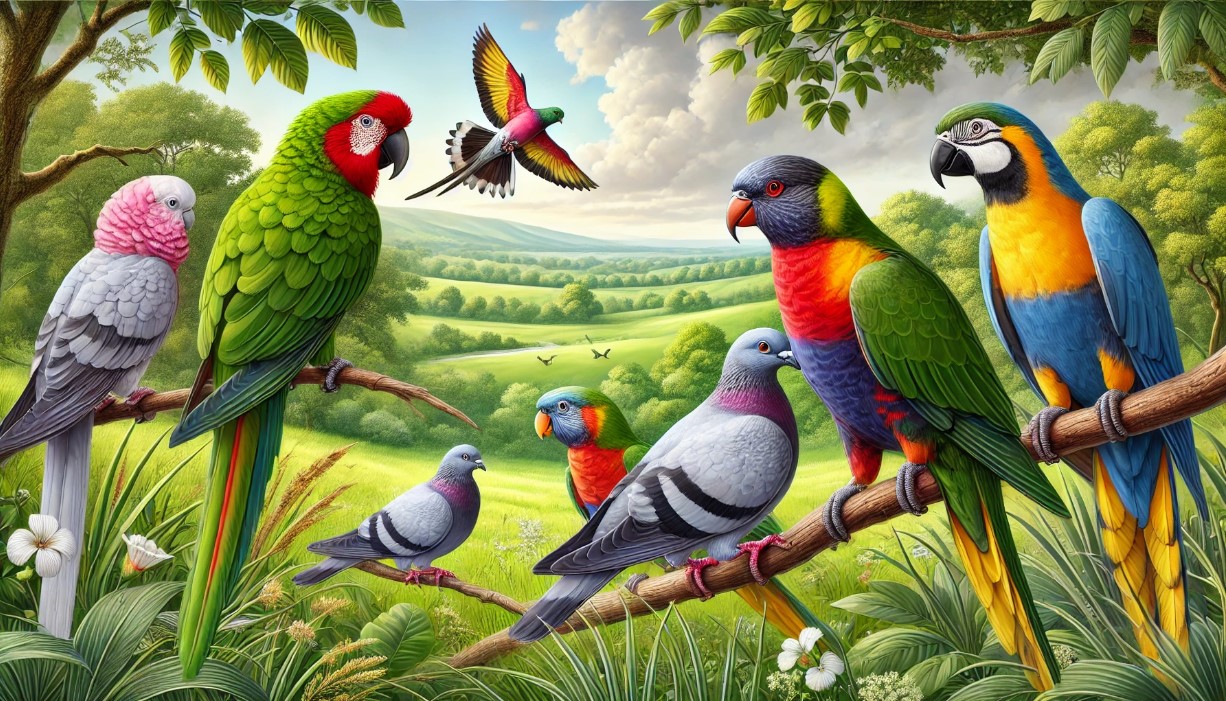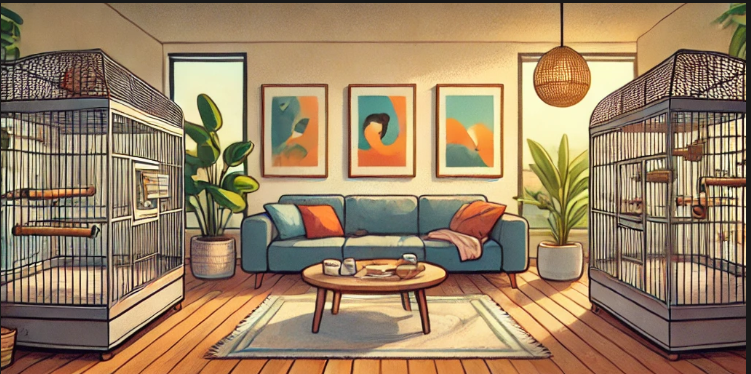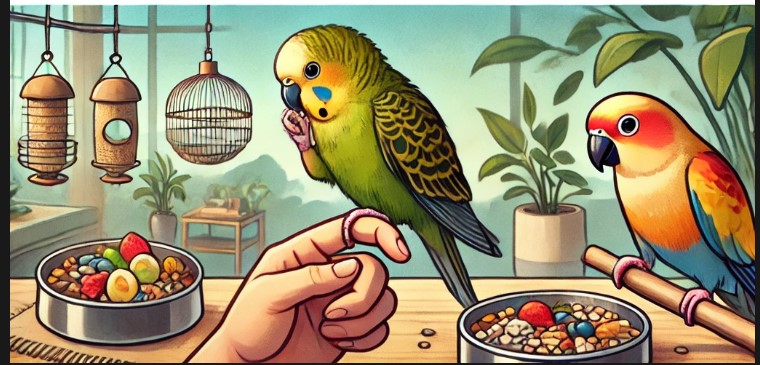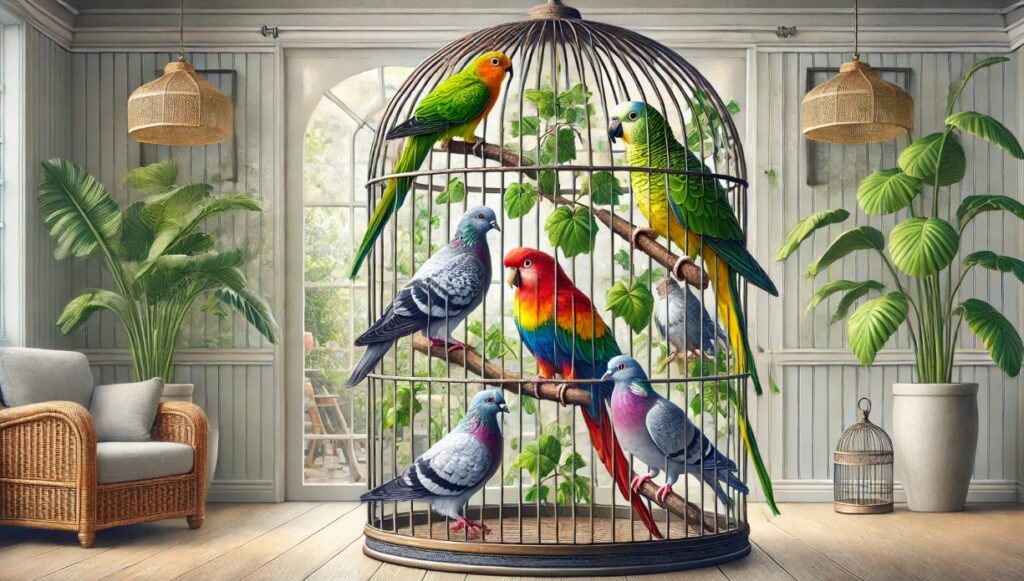How to Care for Pet Birds: The Ultimate Guide

“How to Care for Pet Birds”
If people decide to bring into their homes pet birds it can be rather beneficial but just like having any other pet is not without its rewards. Apart from feeding, and offering the facilities for cleaning, Birds need an extra form of attention. This text will encompass all that is important when caring for Retirees and seniors; the environment, diet, and all subcategories in between.
Introduction
Adopting a bird as a pet can have its benefits, but it is needed to consider some peculiarities connected with their birds’ keeping. Birds being social animals need interaction and activity, a proper diet and a proper environment to lead a healthy life. Now let us look at some of the key areas that you need to ensure as regards to pet bird care in order to produce a healthy, happy and properly socialized bird.
Table of Contents
How to select the correct Bird to be kept at Home
The first thing about bird care is choosing the type of bird compatible with your daily routine. These include parakeets, canaries, cockatiels and parrots’, as some of the most commonly preferred pets to own.
Types of Popular Pet Birds
- Parakeets: Tiny, low maintenance, and friendly.
- Cockatiels: Affectionate and genial; they like to communicate.
- Parrots: I would need a lot of attention and training but on the other hand they are evolved or intelligent.
- Canaries: Not social but recognized with beautiful tunes.
The management of the quality of the life of IMPORTANT Responding to Lifestyles and Environments
Now think about your day and your environment. Some species of birds require more space than others and some such as finches are easy to accommodate in any space available. Make a point to consider the frequency of social communication if you select an extremely sociable breed of pets.
Setting Up a Suitable Habitat
A bird’s cage is their home therefore comfort and safety are of the utmost importance The right cage should be comfortable and safe.
Cage Size and Material
Ensure that the cage you select is spacious enough to allow the bird to spread its wings without coming into contact with cage bar surfaces. Cage of stainless steel is safe and readily available, preferred cages are those that are painted and you should avoid cages with chipping paint as it is poisonous.

Proper Cage Placement
Put the cage in a well-lit area but do not expose it to a lot of sun light. Birds are also sensitive to drafts; therefore, they should be taken out from places with opened windows or doors.
Bird Nutrition: Of course, the most important aspect of keeping any bird is deciding on what to feed your feathered friend.
Recommended Diet for Pets
Avian diets are very important because malnutrition is very rampant amongst pet birds due to poor feeding.
It is also advisable to feed pet birds on the bird’s natural diet of seeds, nuts, and fruits where necessary, cereals especially corn, millet, sunflower and millets, pasta and vegetables where necessary, and rice once in a while.
Birds feed on seeds, pellets, fresh fruits as well as vegetables. Seeds and pellets should be the foundation of what they are offered with fresh foods occasionally.
Foods to Avoid
Do not offer chocolate, caffeine, avocados or salty foods because they are poisonous and cause severe health problems.
Providing Comfort to Your Home
The comfort and well-being of your bird are determined immensely by its immediate environment.
Essential Climatic Conditions; Temperature & humidity
Many pet birds should be kept at temperature ranges of 65 to 85 degrees F (18-29°C). There appears to be some evidence that keeping the general humidity level under 50%, might be beneficial to their respiratory system.
Birds need some safe perches and toys in addition to having food and water thanks to which they would be able to keep on with their daily activities.
Birds require different types of perches for their feet’s health. Category Toys For birds to chew, swing, or play with as they love toys that challenge their brain.
Table of Essential Bird Care Tips: The Ultimate Guide
| Section | Key Tips |
| Select the Right Bird | Consider your lifestyle. Popular choices: parakeets (low-maintenance), cockatiels (affectionate), parrots (social and intelligent), canaries (songful but not social). |
| Setting Up a Habitat | Get a large, stainless-steel cage; place it in a bright, draft-free area with no direct sunlight. |
| Bird Nutrition | Feed a mix of seeds, pellets, fruits, and veggies. Avoid chocolate, caffeine, avocados, and salty foods. |
| Creating Comfort | Keep temperature 65-85°F (18-29°C) with humidity below 50%. Add safe perches and toys. |
| Cleaning and Hygiene | Daily: refresh food and water. Weekly: clean cage thoroughly using water and vinegar. |
| Socialization and Bonding | Talk to your bird and let it approach you. Social interaction and playtime are essential. |
| Mental Stimulation | Rotate toys frequently and allow out-of-cage time for exercise and mental stimulation. |
| Health and Behavior | Watch for signs of illness (fluffed feathers, appetite changes). Consult a vet if needed. |
| Grooming | Trim feathers, nails, and beaks as needed with professional guidance. |
| Handling and Training | Use gentle, calm handling and reward-based training. Teach commands like “step up.” |

Cleaning and Hygiene
If the cage is clean, then the bird is healthy and vice versa. Integrate an effectively function cleaning regimen.
Cleaning which falls under this category includes daily and weekly cleaning tasks.
Feed your pet clean food and water bowl on a daily basis. Daily, the cage trays should be cleaned, and the bars scrubbed to remove bacteria accumulation, although this could be done once a week.
Simple ideas can go a long way towards making your pet’s cage a happier and healthier place to be.
Select bird-safe products and do not clean yourself or allow others to clean with toxic substances. For cage cleaning, the best is to use just water and vinegar solution.
Socialization and Bonding
Birds are social and love to interact with owners.
Ways that You can Adopt and Establish Trust with Your Bird
Gentle focus on destinations around your bird’s cage, and use your voice as a way of bonding. Let them come to you at their own free will.
Adolescent Development: Key Component Importance of Socialization and Play
Birds require their brains to be exercised too, thus toys and social interaction are important. Always bring new toys and recreational activities to the family.
And Mental Stimulation and Exercise
A bird needs to do physical and mental activities.
Engaging Toys and Activities
Keep things interesting by rotating toys. Great choices for foraging toys, puzzles, and mirrors are puzzles, foraging toys, and mirrors.
Out of Cage Time for Mental Health
Out of the cage time is good for birds as it helps them to explore, stretch your wings and socialize.
Bird Health and Behavior
Catching health issues at an early stage requires you to recognize normal and abnormal behavior.
Normal vs. Abnormal behavior
Birds that are healthy are active, curious and are vocal. Fluffed feathers, lethargy, or changes in appetite indicate possibly warning signs.
Early Signs of Illness
Continuous sneezing, breathing problems, changes in droppings are indicative of health problems. If you see any of these signs, consult with a vet.
Grooming Essentials
Keeping your bird groomed keeps it healthy and comfy
Safe Feather, Nail, and Beak Trimming
The feathers and nails should be trimmed by consulting a vet or trained professional. Grooming also helps remove foreign bodies that can make you sick or cause injury.
Pet Bird Handling and Training
Bonding with and training your new bird will depend on your being capable of handling him.

Basic Handling Techniques
Be gentle and calm. Don’t make sudden movements that will startle them. And use of treats to lure your bird to perch on your hand.
Introduction to Training Methods.
Positive reinforcement works well with birds. Simple commands like ‘step up’ and rewards with treats for the step up is the best way to start.
Traveling with Your Bird
Preparation is key when travelling with birds, as birds are sensitive travelers.
Tips for Safe Bird Transport
If possible, use a travel cage that’s secure and have familiar toys. Put the cage in a comfortable place, one where it moves as little as possible.
Preparing for Travel
And slowly introduce your bird to the travel cage. They need to be sure that they have food and water for longer trips.
Seasonal Care and Consideration
There are challenges for pet birds each season.
Different climates have their own ways of protecting your bird from outside.
In winter, don’t put your bird up to cold drafts. And don’t forget to give them a shady, cool place in summer.
Bird Care Common Problems and Solutions
Biting, screaming, and feather plucking may develop into bad habits with pet birds.
Biting, Screaming, and Plucking address
This is easily due to boredom, or lack of socialization. Reduction of these behaviors can be assisted with providing more stimulation and interaction.
Conclusion and Final Thoughts
A responsible pet owner must be dedicated, be patient, and in love to care for a pet bird. As you’ll be providing a safe environment and a top-notch secure diet as well as plenty of social interaction, your feathered friend will live a happy and fulfilled life. A badly cared-for bird can also be a nice companion for years.
FAQs
1. Of what type of cage pet birds are most comfortable?
The majority of pet birds need a large cage with stainless construction to be just large enough for a bird to move and stretch.
2. How often should I clean my bird’s cage?
Add fresh mineral water in separate bowls and wash the enclosure daily in order to avoid the spread of bacteria.
3. Are fruits and vegetables okay for pet birds?
Yes, but fresh fruits and veggies are great additions to their diet to avoid toxic foods such as avocado.
4. When will I be aware that my bird is sick, and what are signs should I look out for?
Even in cases where a bird looks drowsy, having ruffled up feathers or if there are changes in the droppings signifies sickness. However, if you are in doubt, it will be advisable to consult the vet.
5. Do birds need sunlight?
Of course, birds can use natural light and do not lay them down on the sun as this will heat them.


Thought-provoking post! Sprunki Game offers similar creative freedom.
Brilliant observation! Trump Coin demonstrates how perfect timing creates lasting movements.
Outstanding analysis! While exploring AI, AI Tools offers endless possibilities.
Groundbreaking research! AI Tools List shows how AI enhances daily workflows.
This content resonates with magic! Make magic with Sprunki!
Really enjoyed this! Speaking of creative experiences, Sprunki offers an amazing music mixing adventure.
Your creativity inspires! Get inspired by Spunky‘s innovative features.
Absolutely transformative! Just like how Sprunki OC transforms the creative process.
Gaming perfection! Retro Bowl Unblocked showcases elegant design.
Insightful perspective! The Sprunki Retake platform reimagines music creation through its innovative drag-and-drop interface and hip-hop influenced sound library.
KkesD ddmrW CKvhUvO FdZNanVw zyoDLGp FTnU
Thanks for the detailed breakdown of **Super Ace**! It’s great to see how the game blends strategy and luck with features like the Combo Multiplier and wilds. For new players, understanding these mechanics can significantly boost their experience. If you’re looking to dive in, check out Super Ace for more insights and tips to maximize your wins.
I’ve played my fair share of slots, and Super Ace really stands out with its smart blend of luck and strategy. The wilds and free spins add real depth-definitely worth a spin. Check it out at Super Ace Jili.
This post really highlights how AI integration is evolving-tools like MCP Server and Client make it easier to connect and process data securely. For more on that, check out MCP Customer Data Platforms. Great insights here!
Manus AI is impressive for handling complex tasks autonomously, especially in data-driven fields like e-sports betting. It’s great to see AI evolving toward true AGI. For those interested in similar tech, check out Suna AI.
Love the strategy in endless runners like Subway Surfers – it’s all about timing and risk. Check out the Subway Surfers Game for a classic test of reflexes and luck.
Great insights! For those diving into online gaming, checking out Jiliph could boost your strategy with AI-driven gameplay analysis and a solid game selection.
Understanding sports betting requires more than luck-it’s about strategy and insight. Platforms like JLJL PH offer immersive gaming experiences with live dealers and secure transactions, making them a top choice for serious players.
Great insights on AI’s role in streamlining workflows! For those crafting original content, an AI Plagiarism Checker is essential to maintain authenticity and avoid unintentional duplication.
Understanding the statistical odds in lottery games is crucial. Platforms like JiliPH App offer diverse gaming experiences, but math remains the silent player in every bet.
JiliOK 777 offers a beautifully crafted gaming experience with smooth AI-driven insights. Their variety of slots and live games truly shine. JiliOK 777 gets it right!
Great insights on RNGs! It’s fascinating how platforms like superph 26 blend advanced tech with immersive casino experiences to keep players engaged. The balance between randomness and user experience is truly impressive.
Understanding RNGs in gambling tech is key to enjoying platforms like Swerte. Their live dealer and slot games offer a great blend of luck and tech, making every spin or bet exciting and fair.
Great insights! For those looking to unwind, phwin offers a top-tier mix of slots, live games, and fishing-perfect for casual players and enthusiasts alike.
That’s a great point about social interaction in live games! It really makes the experience. Platforms like PH789 Login seem to prioritize that immersive, professional dealer aspect – crucial for a genuine casino feel, right? 👍
Great breakdown on blackjack strategies – it really helps newcomers like me build confidence at the table. It’s exciting to see platforms like Super PH offer live casino options with real dealers, making practice even more realistic.
Really interesting read! It’s smart to build a solid foundation before diving into online games – understanding things like account security is key. I checked out jljl9 login & their focus on responsible gaming education is a great approach! 👍
Fascinating look at gambling’s evolution! It’s incredible how understanding user psychology now drives platforms like sz7777 login – optimizing engagement is key, mirroring historical strategies for attracting players. A smart approach!
Studio Ghibli’s influence on animation is undeniable, and it’s fascinating to see how styles like chibi and AI art pay homage to its charm. Platforms like 지브리 AI are pushing creative boundaries while keeping that nostalgic Ghibli spirit alive.
Great resource for AI insights-tyy.AI Tools is a game-changer for finding curated solutions. Their AI Development section is especially helpful for professionals seeking efficiency and innovation.
Strategic play in video poker really comes down to understanding the math – and tools to help! Seeing platforms like Plus777 Login offer analytical tools is smart. Curious to explore how those insights could refine my approach – check out their 777plus ph registration for more!
Understanding gambling psychology is key to responsible play. Platforms like Jili Online offer engaging games, but it’s wise to stay mindful of behavioral biases and set personal limits.
Gambling should always be approached with care and mindfulness. Platforms like JLJL PH offer fun options, but it’s key to set personal limits and enjoy responsibly. Let’s prioritize well-being in every play!
That’s a solid point about platform stability – crucial for enjoying the races! Seamless access is key, and it’s good to see sites like jiliok login philippines prioritizing a smooth user experience, especially for onboarding new players. It really makes a difference!
Really interesting read! The ease of getting started on platforms like JL Boss Slot – quick sign-up & verification – is key for new players. Makes the fun accessible! Check out a jlboss login for a smooth experience & explore those slots! Definitely a good sign of a user-friendly platform.
That level design was chef’s kiss! Seriously immersive. Been exploring new platforms too – jkboss seems to be gaining traction with its variety of games & easy login process. Definitely worth checking out! 🎮✨
Really interesting analysis! Seeing more platforms like JL Boss Slot streamlining registration & verification is huge for accessibility. Quick sign-up is key – check out their jl boss games for a fast start! Definitely makes the whole experience smoother.
Lottery patterns are fascinating, aren’t they? Seeing those numbers shift… reminds me of exploring different games – I heard 99win slot download has a huge variety! Hoping for good luck for everyone playing, cautiously optimistic is the way to go! ✨
Interesting read! Seeing innovation in online gaming tech is crucial, especially with security becoming paramount. Platforms like 33wim link are pushing boundaries with features like biometric verification – a smart move for players & operators alike!
Really interesting analysis! Seeing platforms like kunwin casino prioritize tech & fast performance is a game-changer for Vietnamese players. Smooth logins & secure wallets are key – exciting to see innovation happening! 🤔
Interesting take on maximizing returns! Thinking about player experience, platforms like 789vin login really focus on localized fun – quick registration & Vietnamese support are key for engagement. Good strategy discussion!
That’s a great point about accessibility in shooting games – often overlooked! It’s cool to see platforms like jl boss com focusing on smooth experiences, even with quick deposits & easy logins – vital for new players! Really changes the game.
Live dealer games really do feel more immersive, don’t they? It’s great seeing platforms like BossJL prioritize that experience for Filipino players. If you’re looking for a seamless start, check out the bossjl app download apk – easy registration & quick funding! Lots of slots too!
Understanding baccarat patterns is key, but a solid platform matters too. Seamless access & security, like with the jl boss app, can really enhance the experience. Registration seems straightforward too! 🤔
Really interesting read! Seeing how platforms like ph987 legit are tailoring experiences for specific markets (like the Philippines) is key. User experience & security seem crucial for success these days! 👍
That’s a fascinating take on recent racing trends! It’s interesting how platforms like jljl55 ph app online casino are adapting to offer diverse gaming, mirroring that excitement. User access & security are key, right? 🤔
RTP analysis is key to enjoying slots – finding those sweet spots makes all the difference! Seeing platforms like jili pg casino cater to Filipino players with easy app downloads is great for accessibility too. Fun & secure experiences are a win!
Interesting points about responsible iGaming! Robust KYC processes, like those used with the jlsss app, are crucial for player security & regulatory compliance. A curated game selection is also key for a good experience.
Roulette’s randomness is fascinating – the math really does hold up over time! Seeing platforms like 365jili offer diverse games shows how far online casinos have come. Account security & verification (KYC) are key, as highlighted on their site – smart move!
Dice games are surprisingly mathematical! Thinking about probability & strategy really enhances the fun. Seen some cool Vietnam博彩平台 like okking99 com offering diverse games – interesting to see how they apply those concepts too! 👍